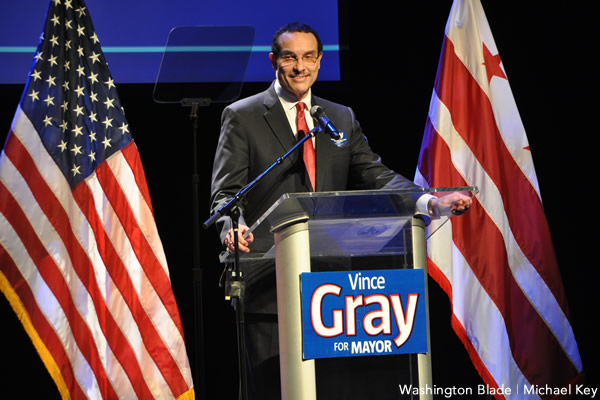Local
Gray, Mendelson receive top GLAA ratings for April primary
Graham outscores opponent in Ward 1 Council race
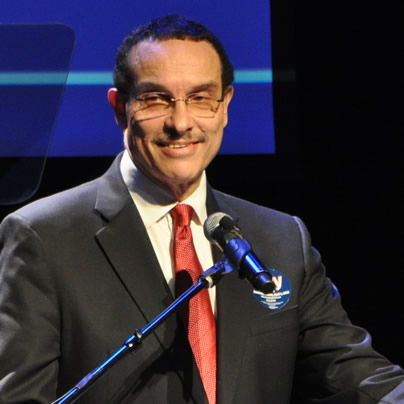
Gray and Mendelson, who are longtime supporters of the LGBT community, were the only two candidates to receive a +10 among a total of 43 candidates rated in contests for mayor and seats on the City Council.
Council members Tommy Wells (D-Ward 6) and Jack Evans (D-Ward 2), who are running for mayor, came in close behind Gray with ratings of +9.5 and +8 respectively. Both have also been longtime supporters of the LGBT community.
GLAA is a non-partisan LGBT advocacy group founded in 1971. It says it rates candidates on the basis of their past records on LGBT, AIDS and other issues deemed important to the LGBT community and on their responses to a detailed questionnaire that asks about those issues.
The group has said it gives higher ratings to candidates that go beyond just expressing support on LGBT issues when they show through their questionnaire responses an understanding of the issues and how best to address them.
GLAA President Rick Rosendall called the LGBT related records of Wells and Evans “excellent” and noted that the group said in its statement that Evans has the longest record of support due to his 20-year tenure as a Council member. He said Gray and Mendelson received a +10 score because both had undertaken a large number of pro-LGBT initiatives in the last few years that, along with their strong past records, gave them an edge over the other candidates.
“Mr. Gray’s accessibility, responsiveness, and follow-through have made him highly effective on LGBT issues,” GLAA said in its statement. “He has been a champion for transgender people, including with Project Empowerment job training.”
Among the other mayoral candidates running in the April primary, Busboys and Poets restaurant owner and progressive political activist Andy Shallal received a +6; Council member Muriel Bowser (D-Ward 4) received a +5.5; attorney and former State Department official Reta Jo Lewis received a +4.5, Council member Vincent Orange (D-At-Large) received a +3; and businessman and civic activist Carlos Allen received a “0” rating.
In its statement accompanying the ratings, GLAA said Allen received an automatic score of “0” under the group’s policy for candidates who don’t return the questionnaire and have no known record on LGBT issues.
All of the Democratic mayoral candidates that returned the questionnaire expressed strong support for LGBT rights in general.
Among the non-Democratic mayoral candidates, GLAA gave Statehood-Green Party candidate Faith a +3.5 and gay Libertarian Party candidate Bruce Majors a +2.
Majors, a longtime LGBT rights advocate, received a +2 rating because “his party’s ideological distrust of government is at odds with policies and reforms favored by GLAA,” the group said in its statement. “Consequently, many of his responses were interpreted as non-responsive or negative,” the statement says.
Gay D.C. Council member Jim Graham (D-Ward 1) received a +7.5 compared to his sole opponent in the Democratic primary, public relations executive and community activist Brianne Nadeau, who received a +5.
Political observers say Graham is facing his toughest re-election race this year for a fifth term on the Council
GLAA said it gave Graham higher points for his long record of support on LGBT and AIDS related issues, citing his work recently on pushing through a bill to provide better services to homeless LGBT youth. The group gave him a slight edge over Nadeau in the substance of his questionnaire responses.
But the group gave Nadeau a slight edge over Graham over the two candidates’ positions on an issue GLAA has long considered important – whether tiny, ad hoc neighborhood citizens groups should be given legal standing to protest liquor licenses of restaurants and bars.
GLAA favors giving exclusive authority to challenge liquor licenses to the city’s elected Advisory Neighborhood Commissions rather than un-elected ad hoc groups, which nightlife advocates say unnecessarily block or delay the approval of licenses for nightlife establishments, both gay and straight. Nadeau, a former ANC commissioner, said she supports giving ANCs the sole legal standing to contest liquor licenses.
GLAA said Graham didn’t take a position on the issue in his questionnaire response, saying he described instead how he helped facilitate a committee of citizens and businesses representatives to consider the issue.
In the Council Chair race, GLAA said Mendelson’s +10 rating reflects his record as an ally who has shepherded through the Council a long list of LGBT supportive bills, including the marriage equality bill.
The group said it gave Mendelson’s opponent, Democrat Calvin Gurley, a “0” rating because Gurley didn’t return the questionnaire and also has no known record on LGBT issues.
Among the five Democrats running in the At-Large Council race, challenger Nate Bennett-Fleming, who currently serves as the city’s non-paid “shadow” U.S. Representatives, received a +7, one point higher than the +6 rating GLAA gave to incumbent Council member Anita Bonds, who won the seat in a special election last year.
Both are strong supporters of LGBT rights. But the slightly higher rating for Bennett-Fleming, a recent law school graduate relatively new to the local political scene compared to Bonds, who has been active in politics and government since the 1970s, is likely to raise eyebrows among some local activists.
GLAA President Rick Rosendall said Bennett-Fleming’s questionnaire responses included a few more substantive insights than Bonds’ but called both candidates’ responses “very good,” saying GLAA considers a rating of +5 and above to be a good showing for a candidate.
The ratings for the other At-Large Democratic candidates were: Pedro Rubio, +3; John Settles II, +2.5; and Kevin Valentine Jr., 0. Valentine is among the candidates who didn’t return the questionnaire and have no known LGBT record, GLAA said.
Among the non-Democratic At-Large candidates running in their respective party primaries, Statehood-Green Party candidate Eugene Puryear received a 4.5; Statehood-Green Party candidate G. Lee Aikin received a +3; and Libertarian Party candidate Frederick Stein, who didn’t return the questionnaire, received a “0.”
Gay Republican candidate Marc Morgan, who’s running unopposed for the GOP nomination for the At-Large Council seat, received a +2. GLAA said he didn’t return the questionnaire.
In its statement accompanying the ratings, GLAA said Morgan’s record of involvement in LGBT rights activities in Ohio and Arizona and his involvement with the National Minority AIDS Council in D.C. were counted in his favor and viewed as “very admirable.”
The statement says Morgan lost points for “his support for anti-gay politicians John Boehner, Robert Ehrlich, and Laura Knapereck,” which “detract from his record.” Boehner, a Republican and Speaker of the U.S. House, among other things, has blocked the Employment Non-Discrimination Act, or ENDA, an LGBT rights bill, from coming up for a vote in the House. Ehrlich is a former Maryland governor and Knapereck has served in the Arizona legislature.
In the remaining Council races, GLAA issued these ratings:
Ward 3: Council member Mary Cheh (D), +8.5; Ryan Sabot (Libertarian), “0” [Questionnaire wasn’t returned].
Ward 5: Council member Kenyan McDuffie (D), +4.5; Kathy Henderson (D), “0” [Questionnaire was returned but GLAA disagreed with most responses]; Carolyn Steptoe (D), -2.
GLAA said Steptoe didn’t return the questionnaire and is viewed as having a negative record for testifying in support of placing D.C.’s same-sex marriage law on the ballot in a voter referendum in 2010.
Ward 6: Charles Allen (D), +8.5; Darrel Thompson (D), +2; Pranav Badhwar (Libertarian), +2.
Allen, the former chief of staff for Wells, received the highest rating for a non-incumbent running in the primary. In its statement, GLAA said Allen has a long record of support for LGBT issues both as a former Council staffer and former president of the Ward 6 Democrats.
GLAA’s detailed analysis of its ratings, including links to the candidates’ questionnaire responses, can be found here: http://www.glaa.org/archive/2014/primaryratings.shtml
District of Columbia
LGBTQ voters divided in Ward 8 special election
All four candidates on DC Council seat ballot are allies

Political observers, including LGBTQ activists, believe LGBTQ voters in Ward 8, like most if not all voters in the ward, are divided over which of the four candidates to support in the July 15 special election to fill the ward’s vacant D.C. Council seat.
Each of the four candidates, all of whom are Democrats, including ousted Ward 8 council member Trayon White, who is running to recapture his seat, have expressed support for LGBTQ related issues.
The special election was called earlier this year after the D.C. Council voted unanimously to expel White following his indictment and arrest by the FBI on a federal bribery charge in August 2024.
He has pleaded not guilty to the charge and under D.C. law he can legally run for and regain his council seat until the time he is convicted of the charge. His trial is scheduled to begin in January 2026.
The three candidates challenging White — Sheila Bunn, Mike Austin, and Salim Adofo — are longtime Ward 8 community advocates who have been involved in local government affairs for many years and, according to LGBTQ activists who know them, have been supportive of LGBTQ rights.
White also has a record of supporting LGBTQ issues while serving on the council since 2017. Following his indictment, he won re-election by a wide margin in the November 2024 general election against a lesser-known Republican opponent.
Political observers say White’s indictment on a bribery charge is likely to alienate some of his past supporters, but they say he remains popular in the ward, and with three candidates dividing the opposition vote he could win the election with less than 50 percent of the divided vote count.
Two of the candidates, Bunn and Adofo, responded to a request by the Washington Blade sent to each of the four candidates asking for a statement summarizing their positions on LGBTQ related issues. In their respective statements Bunn and Adofo expressed strong support on a wide range of LGBTQ issues.
“In my nearly 30 years of public service, I have consistently supported the rights and worked to improve the quality of life for the LGBTQIA+ community,” Bunn said in her statement. She noted that much of her work on behalf of LGBTQ rights took place when she served as chief of staff for D.C. Congressional Delegate Eleanor Holmes Norton and as a senior staff member for former D.C. Mayor Vincent Gray.
In his statement, Adofo said he advocated for a wide range of LGBTQ issues, including housing programs for homeless LGBTQ youth and supportive employment training programs for transgender residents.
“At the heart of our platform is a steadfast commitment to uplifting LGBTQ+ communities, ensuring that policy is shaped not just for them, but with them,” his statement says. Adofo’s positions in support of LGBTQ rights are also posted on his campaign website.
GLAA D.C, formerly known as the Gay and Lesbian Activists of Washington, released its ratings of three of the four candidates on June 22, based on its recent policy of basing its ratings mostly on non-LGBTQ specific issues. The group rates candidates on a scale of -10, the lowest possible rating, to +10, its highest rating.
It assigned a rating of +7.5 for Bunn, +6.5 for Austin, and +4.5 for Adofo. In a statement accompanying its ratings, GLAA said each of the three have a record of support on LGBTQ issues, but they lost rating points for not supporting non-LGBTQ related issues deemed important by GLAA.
GLAA said it did not issue a rating for White based on its policy of not rating candidates who are removed from office or resign due to allegations of ethics violations.
The Capital Stonewall Democrats, D.C.’s largest local LGBTQ political group, chose not to make an endorsement in the Ward 8 special election.
“We thought that this is best because this is a special election and in these unfamiliar times, we decided not to take a stand,” Howard Garrett, the group’s president, told the Blade.
Ward 8 gay Democratic activist Phil Pannell is supporting Adofo, he told the Blade, on grounds of Adofo’s strong support on LGBTQ issues and Adofo’s role as the only candidate in the Ward 8 special election who supported Initiative 83, the ballot measure passed by D.C. voters in November 2024 calling for a ranked choice voting system and open D.C. primaries. A lawsuit challenging the initiative filed by the D.C. Democratic Party has delayed its implementation.
Another longtime Ward 8 gay Democratic activist, David Meadows, is supporting Bunn. Meadows cites Bunn’s support for LGBTQ rights and her positions on other issues he supports as his reason for backing her candidacy.
The D.C. Board of Elections website shows that the board mailed ballots for the special election to all Ward 8 registered voters. The website shows that as of July 7, 2,483 voters sent back their ballots by mail or placed them in drop boxes located throughout the ward.
Early in-person voting at several polling places was scheduled to begin July 11, the website says, prior to the official election date of July 15 at all polling places throughout the ward.
Salim Adofo statement on LGBTQ issues:
Our campaign is rooted in the belief that everyone deserves to live with dignity, security, and opportunity. We are committed to building a safer, healthier, and more equitable District for all — where every voice is heard and every community is empowered. At the heart of our platform is a steadfast commitment to uplifting LGBTQ+ communities, ensuring that policy is shaped not just for them, but with them. We recognize that the fight for equity is interconnected, and we prioritize action in the areas that most deeply impact our residents’ daily lives. As [a] council member, I will advocate for healthcare for all, boost funding for HIV/AIDS, Hepatitis, STD, and TB Administration (HAHSTA) programs to address disparities in health outcomes.
• Expand access to care by exempting digital-only telehealth services from the Certificate of Need (CON) process and increasing funding through the Department of Behavioral Health (DBH).
• Build a culturally competent workforce by removing licensure barriers and expanding the pipeline of LGBTQ+ mental health providers.
• Employment and economic equity: sustain workforce development efforts like Project LEAP, a successful investment in economic empowerment for TGD residents.
• Foster public-private partnerships by requiring D.C. HR to work with labor unions and local employers to host trans-affirming job fairs.
• Fund community-led training by supporting programs developed by TGD organizations, modeled after California’s Transgender Economic Empowerment Initiative.
• Housing with dignity: every LGBTQ+ resident deserves stable, affirming, and permanent housing. End youth homelessness with a community-centered strategic plan focused on expanding permanent housing and wraparound services.
• Support inclusive housing by continuing funding for LGBTQ+ housing vouchers and senior housing initiatives.
• Safety and community support: create safe shelters by investing $2 million in a 20-bed LGBTQIA2S+ shelter for survivors of intimate partner violence and sexual assault.
• Empower community organizations with no-cost capacity-building support and streamlined access to D.C. grants for LGBTQ+-serving CBOs.
Sheila Bunn statement on LGBTQ issues:
In my nearly 30 years of public service, I have consistently supported the rights and worked to improve the quality of life for the LGBTQIA+ community.
As chief of staff to Congresswoman Eleanor Holmes Norton, I helped prevent Congress from overturning the District’s 2009 marriage equality bill and worked on removing congressional riders from the District’s budget that prohibited the expenditure of locally raised funds for our needle-exchange program, which has been pivotal in HIV/AIDS prevention.
As part of Mayor Vincent C. Gray’s senior staff, I assisted in launching the District’s transgender employment initiative under the Project Empowerment Program, increasing training and job opportunities for transgender residents. We also employed a member of the transgender cohort in the Mayor’s Office of Community Affairs after their tenure, demonstrating our commitment to the program. I facilitated efforts to end health insurance discrimination based on gender identity with DISB’s 2013 bulletin, ensuring coverage for services like mastectomies and hormone replacement therapy. Additionally, I helped to coordinate Mayor Gray’s first LGBTQIA+ Youth Town Hall to address the concerns of LGBTQIA+ youth and participated in cultural competency training to better support the District’s significant LGBTQIA+ population.
Currently, I am a member of the Capital Stonewall Democrats, actively engaging in Pride events and supporting LGBTQIA+ causes like the DC LGBTQ+ Community Center, a one-stop shop for services and programs with critical social service partners. Through direct outreach to organizations serving the LGBTQIA+ community, I aim to understand and represent their issues effectively. I look forward to collaborating with GLAA, Capital Stonewall Democrats, and other allied organizations to shape legislation and policies that benefit our LGBTQIA+ residents and all District residents.
Virginia
Defying trends, new LGBTQ center opens in rural Winchester, Va.
‘It has taught me that I am not alone in this place’
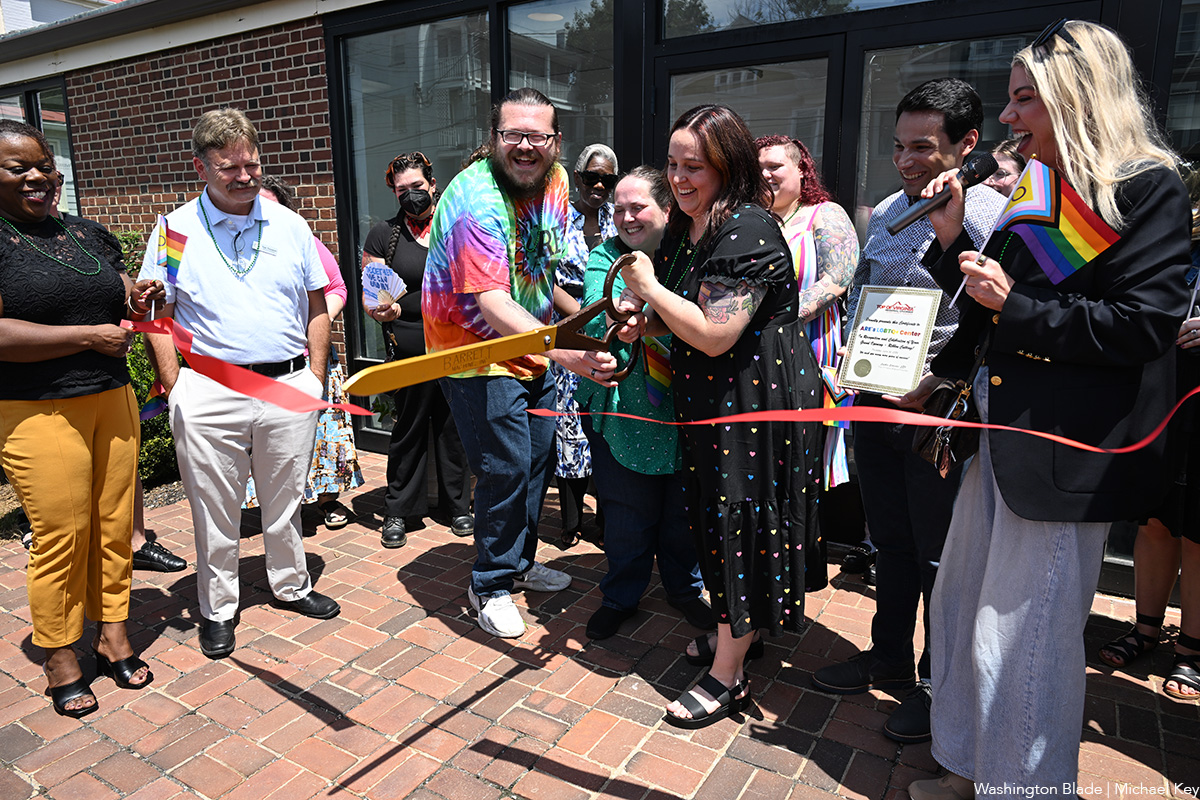
A new LGBTQ community center celebrated its grand opening on June 30 in Winchester, Va., defying recent trends amid a federal crackdown on DEI and LGBTQ funding.
The local HIV/AIDS service organization AIDS Response Effort, Inc. (ARE) worked with a team of volunteers to open the area’s first physical center.
ARE’s R.I.S.E. (Resources, Inclusion, Support and Empowerment) Center, located near the heart of Old Town Winchester on West Piccadilly Street, is more than a renovated bank building to the local LGBTQ community. The empty teller window on the side of the structure and converted vault inside give away the building’s past. But the volunteers, program participants, and well-wishers gathered at the ribbon-cutting ceremony tell the Blade that they are hopeful for a thriving future for the building — and the community.
The Washington Blade spoke with the executive director of ARE as well as the co-directors of ARE’s R.I.S.E. Center during a tour of the facility ahead of the opening.
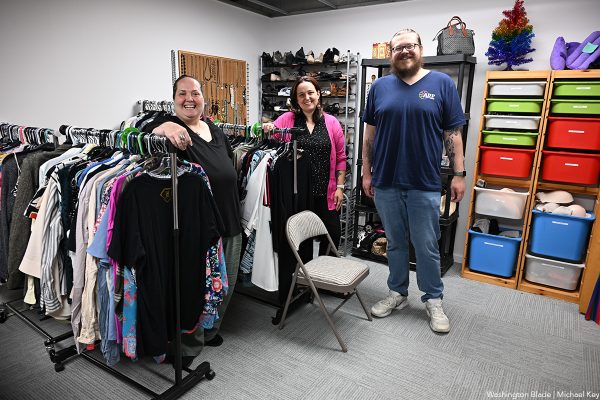
Katy Vance, executive director of ARE told the Blade, “I started [at ARE] about five years ago and we were an AIDS service organization, we have been for about 35 years now. We started as a group of volunteers out at the hospital —with Valley Health, and we’ve grown into a program that provides HIV case management for folks living with HIV in the community.”
Vance explained that as community needs have changed for service organizations like ARE, it has led to some soul-searching among advocates.
“We had this big meeting about, ‘who are we?,’ ‘who do we want to be?,’ ‘who do we want to be in a few years?,’” Vance recalls. “As things shift and change with HIV … we have a lot of folks that come into our office who are newly diagnosed. They will get connected to a medical case manager, they’ll get on medication, and they are undetectable within one to two months, which means they are untransmittable, which is amazing.”
“So, science and technology has come so far,” Vance continued. “And so, who are we when this tends to go in the direction of no longer being the major epidemic it has been for the last 40 years, right?”
“But, when I came in, we also had a general housing program for anyone in the community,” Vance said. “That was confusing for a lot of people who came into our doors trying to figure out who we were and what we are. We called it, our ‘identity crisis,’ essentially.”
“Are we an HIV service organization? Are we a housing program?” Vance asked. “So we worked with our local Goodwill and the board got together and we decided to transition our housing program out and we realized we wanted to open an LGBTQ center.”
“We have had a little bit of pushback as to why an HIV agency is opening a center,” ARE’s R.I.S.E. Center Co-Director Matt Buracker said. “Obviously, HIV and LGBT identities have a long history and a lot of stigma, but we felt like it was kind of irresponsible to talk about one without talking about the other. And we’ve always been supporting the LGBT community, so we’re just expanding our services to encompass more.”
The center seeks to serve the LGBTQ community in a county that Donald Trump carried with more than 63% of the vote in the 2024 election. While ARE receives state and federal grants for its operations, the LGBTQ center is currently funded by community donations and a founders’ campaign and is staffed with volunteers.
Vance tells the Blade that the Center met its initial fundraising goal of $50,000 very quickly. The building housing the center was renovated with a combination of grants, donations and volunteer work.

“I think our fundraising goals now are going to be more programmatic so that we can do the things that we want to do,” R.I.S.E. Center Co-Director Mary Bohacek said. “Because Matt and I are great at finding things to do for free. But there are other things that people are asking us to do, craft events or things that aren’t free to do. Eventually, we might need a license if we want to do movie screenings. So there is always going to be a fundraising need to fund the programming, but the building has been a huge success.”
“The support from the community has been overwhelming,” Buracker told the Blade. “We’ve had such a positive response from the community and it’s just it’s been so emotional to see that the need has been here and we are the one to finally do something about it.”
Vance interjected, “And of course, there are community members that aren’t a fan that are ‘keyboard warriors’ that are coming out saying stuff. What is amazing is: we had an article in the paper and they put it up on their Facebook page and people were making just terrible comments. But then, we got new volunteers from that. The community support has been, like Matt said, amazing and overwhelming.”
ARE’s R.I.S.E. Center is a member of CenterLink, a community of LGBTQ centers. Other LGBTQ community centers in the wider region include the Roanoke Diversity Center in Roanoke, Va, the Shenandoah LGBTQ Center in Staunton, Va., Diversity Richmond in Richmond, Va., NOVA Prism Center in McLean, Va., the DC Center for the LGBT Community in Washington, D.C. and the Frederick Center in Frederick, Md. A new MoCo Pride Center is scheduled to open in Bethesda, Md. in August.
While the physical building opened to the public on June 30, the R.I.S.E. Center in Winchester has held events for more than a year.
“We’ve had programming going on for almost two years now,” Bohacek told the Blade. “Our first event was a ‘Friendsgiving.’ There were so many people that showed up that we literally didn’t have enough space: we needed to knock down walls.”
The staff and volunteers at ARE and the nascent Center used that momentum to foster the growth of affinity groups, community groups and services.
Affinity groups are described as “not just support groups or social groups, but rather as something of a hybrid between the two.” As Bohacek says about the affinity groups, “if someone needs community or needs a place to talk about queer issues, they have a space to do that.”
Affinity groups hosted by the Center include a group for trans and gender non-conforming people, a group for the families of trans people, a polyamorous affinity group, an aro-ace group, a “Rainbow Connection” all-purpose group, and a “Gay-RP” affinity group for people 50 and older.
“We also have a young adult group, which is for ages 18-25, which is one of the more vulnerable sections of our community,” Bohacek said. “So we want to make sure that they have places to connect.”
As reported in the Blade, the youth advocacy organizations Hopelab and Born this Way Foundation recently issued a report that suggests LGBTQ youth (ages 15 to 24) living in rural communities face greater challenges than their suburban or urban peers in dealing with their sexual orientation or gender identity, though have significantly benefited from online resources.
“We also have some community-wide programming that allies are welcome attend,” Bohecek said. Programming includes a monthly game night, a volunteer night for the many Center volunteers, as well as the “stitch and bitch” group, who “sit, crochet, embroider and talk.”
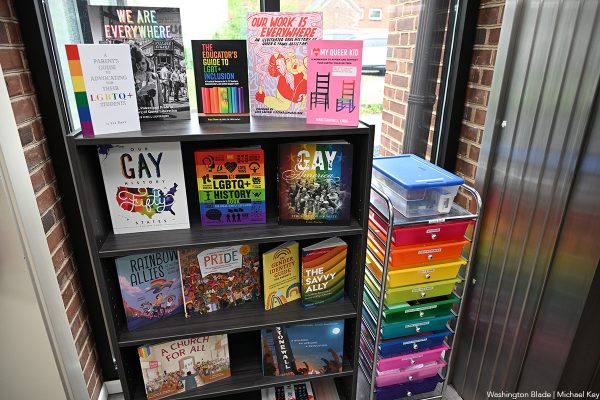
“And Coffee and Coloring!” Bohecek exclaims. “That’s one of my favorites. We like to say it’s about — just sit down, relax, have a cup of coffee — but frankly it’s about community building.”
Bohacek proudly lists the many other services the center offers, including a transgender/gender-affirming closet, which is currently overflowing with donations of clothes.
“We also have an amazing library of all kinds of identities and all kinds of ages for people to come and see,” Bohacek told the Blade. “This building is actually an old bank, so we put our books into the vault.”
The old bank, now vibrant community center, was filled to capacity for the official opening ceremony on a hot Monday afternoon in late June. People from across the Shenandoah Valley who had come to the ribbon-cutting event snacked on rainbow-colored cupcakes as they toured the renovated building.
“To be a gay man growing up in a small, rural area . . . we didn’t have anything like this,” Front Royal, Va. resident Ed McKee told the Blade. Though he lives in a town a few miles away, he works at a salon in Winchester and had come to see the new center opening.
“We didn’t have anything like this when I was growing up,” McKee said as he gestured toward the packed LGBTQ community center. “If we had, it would have made my life so much easier. I probably would have come out sooner — I didn’t come out until I was about 30 — because I would have felt the support, you know?”
“Especially now with everything that is going on in our country,” McKee continued. “We need to show strength in numbers: come together. And the center is allowing for that to happen.”
McKee’s husband, Winchester business owner Paul Miller, agreed.
“I’m hoping that [the Center] can be a great way to connect with people who might not otherwise understand how they can come together,” Miller told the Blade. “And I’m hoping that, while I’m not sure that this is its mission, I’m hoping that it has a political effect in Virginia.”
Members of the community who came to witness the opening gathered outside of ARE’s R.I.S.E. center for the ribbon cutting. Speakers at the ceremony included the Center’s co-director Bohacek.
“Today, we’re celebrating the renovation of the building,” Bohacek began. “But, we’re also celebrating the rise of this community.”
“This community has taught me resilience and it has taught me friendship and it has taught me that I am not alone in this place,” Bohacek told the crowd. “There are people that care. And we are so proud to have a place where we can be ourselves, where anyone and everyone is welcome — and we mean it. So, with that said, let’s keep on rising!”
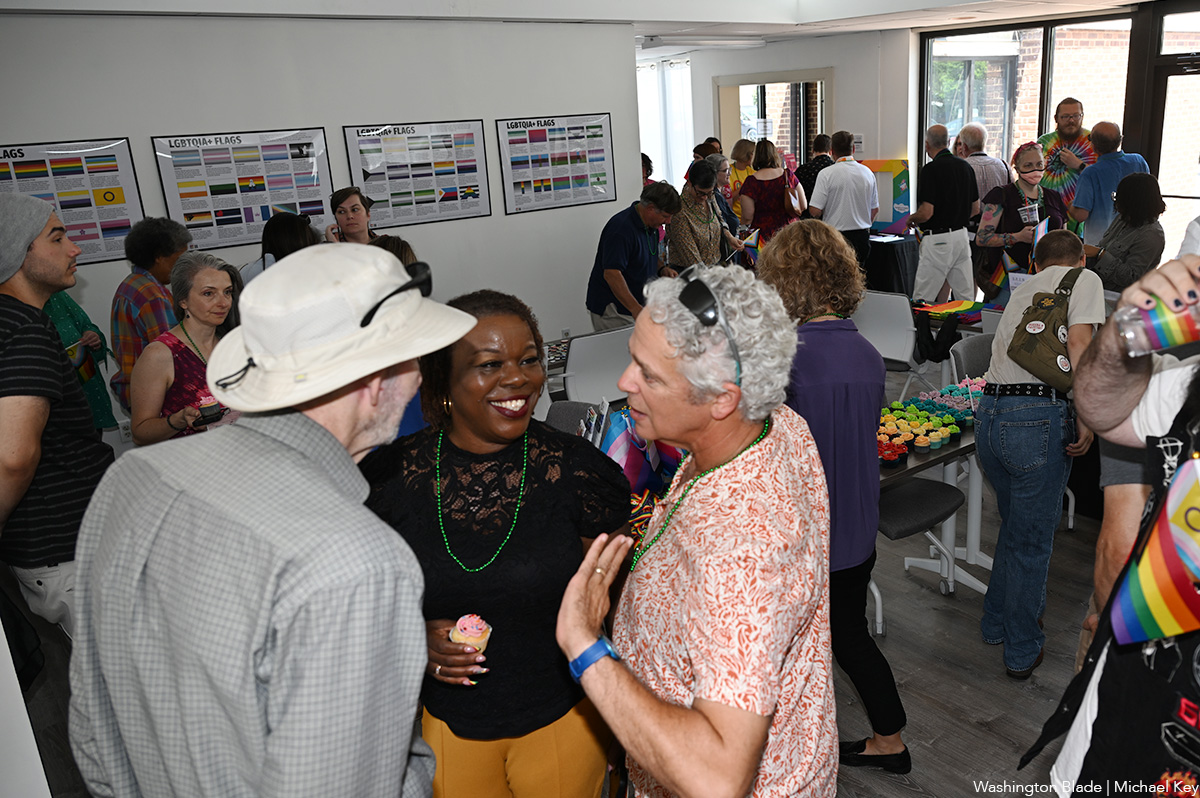
Maryland
Maryland’s oldest rural gay bar — and one of the last — is a log cabin in the woods
The Lodge is a Boonsboro watering hole resembling a log cabin

By SAPNA BANSIL | In the woods of a conservative Western Maryland town of fewer than 4,000 people is an unlikely landmark of state LGBTQ history.
The Lodge, a Boonsboro watering hole that resembles a log cabin, is Maryland’s oldest rural gay bar — one of a few remaining in the country, according to historians.
For about four decades, the Washington County venue has offered safety, escape and community to queer people far from large, liberal cities. Starting Friday night, The Lodge will close out Pride month with one of its biggest parties of the year: a weekend of dancing, drinking and drag in celebration of Frederick Pride, held about 20 miles away in the area’s largest city.
The rest of this article the Baltimore Banner published on June 27 can be read on its website.

